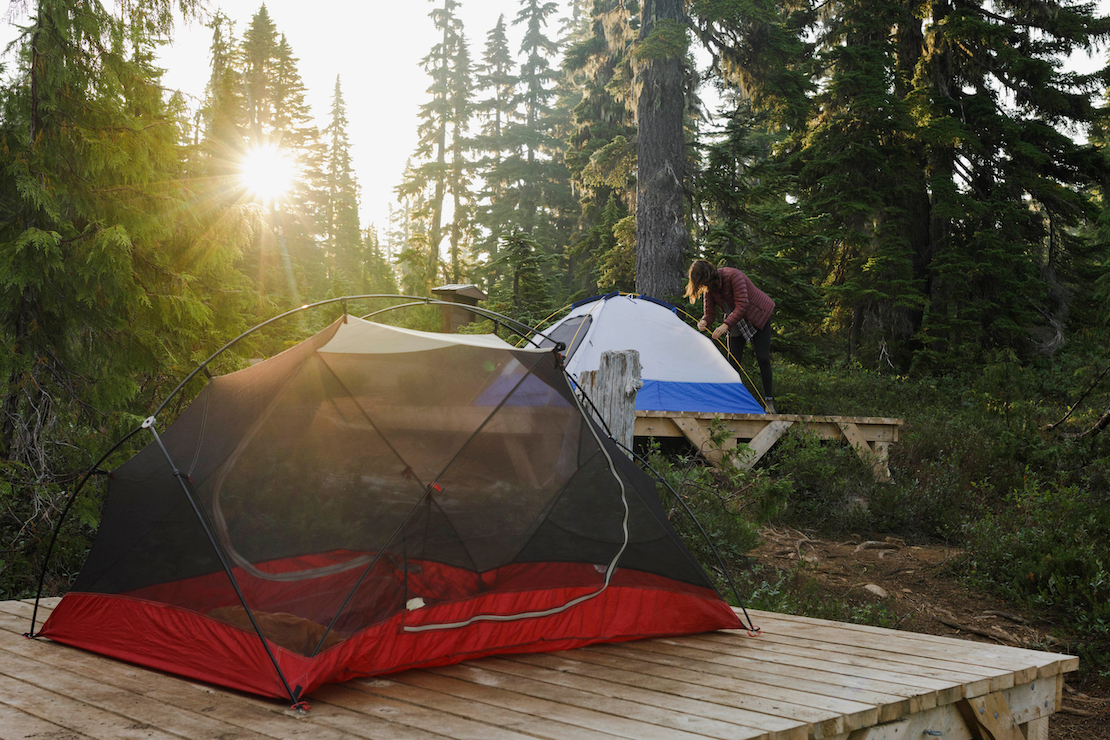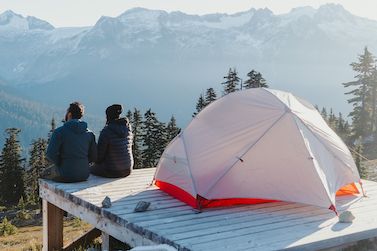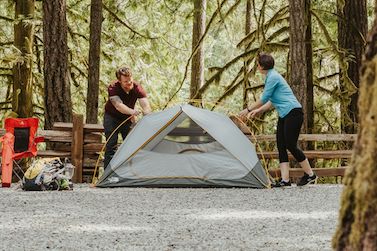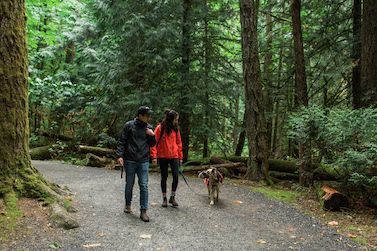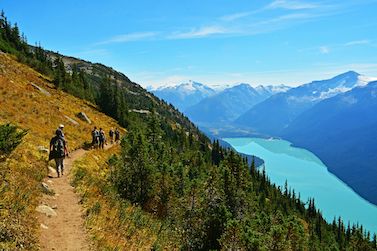Backcountry camping is the perfect way to enjoy British Columbia’s natural beauty. Some BC Parks have reservable backcountry campgrounds. In backcountry areas that do not offer reservations, a backcountry camping permit is often required. This page provides detailed information on registering for a backcountry camping permit.
‘Backcountry’ means an area more than 1 km away from any highway or park road.
Look here to learn about:
All visitors to the backcountry are expected to follow Leave No Trace outdoor ethics. For details, see responsible recreation, below.
About backcountry permits
You need a backcountry permit to stay anywhere that camping fees are charged. Most parks charge fees for backcountry camping, but some do not. To find out if the park you are visiting charges backcountry fees, see the camping fees and policies supplement [PDF].
At many parks, you can register and pay for a backcountry permit in advance. This is available exclusively online via the BC Parks reservation service. To learn more, see registering in advance, below. To understand how this differs from making a reservation, see the difference between reservations and permits, below.
At parks without advance registration, you may be able to self-register and pay your fees when you arrive. If self-registering, you must pay your camping fees in cash only. To learn more about in-park registration, please see the self-registering section below.
The number of backcountry permits available for any given park is not limited. Permits cannot ‘sell out’.
At some BC Parks, backcountry camping is allowed year-round. Others are closed to backcountry camping at certain times, especially in the winter. Before planning a camping trip at any BC Park, always use our find a park tool to visit its webpage. The park page provides dates of operation and other park-specific information.
The difference between reservations and permits
You need a permit to camp anywhere that camping fees are charged. You register for a permit when paying your fees. When you make a reservation and pay your fees, we automatically register you for a permit. If reservations are not available, you register for a permit and pay your fees either online or at the park.
Making a backcountry reservation guarantees you a tent pad at a specific campground. There is a limited number of tent pads available, and they are in high demand at reservable campgrounds. Therefore, the number of reservations available for any given campground is limited. These campgrounds often sell out.
When reservations are not available, registering for a backcountry permit does not guarantee you a spot at a specific campground. It simply allows you to camp at backcountry campgrounds throughout a park. The number of these backcountry camping permits available is not limited. They cannot sell out.
How to get a permit
Anyone 16 years of age or older can register for a backcountry camping permit by:
- Registering in advance via camping.bcparks.ca
- Self-registering and paying fees in cash at select major trailheads
Not all parks with backcountry campgrounds currently accept advance registration. For a list of participating parks, see parks with advance backcountry permit registration, below.
Registering in advance
Backcountry conditions can change rapidly. Please register as close as possible to your intended arrival. For details, see when to register, below.
Advance backcountry permit registration is available only via camping.bcparks.ca. You cannot purchase a backcountry permit via the call centre. After you register online, you receive a confirmation email, which includes your permit.
More than 25 parks currently offer backcountry permit registration in advance through camping.bcparks.ca. For a list of participating parks, see parks with advance backcountry permit registration, below.
Some parks that offer advance registration do not have self-registration facilities. Please register in advance when available.
Registering for a backcountry permit online allows to you to pre-pay your camping fees. For specific fees at parks that accept advance registration, see the nightly backcountry camping fees table, below.
Most of the parks that accept advance permit registration are open for backcountry camping year-round. To confirm that a park is open for camping, visit the individual park pages listed below.
Parks with advance backcountry permit registration
- Akamina-Kishinena
- Bugaboo
- Cape Scott
- Carmanah Walbran
- Desolation Sound
- Dionisio Point
- Discovery Island
- E.C. Manning
- Elk Lakes
- Golden Ears
- Halkett Bay
- Inland Lake
- Jedediah Island
- Juan De Fuca
- Kokanee Glacier
- Main Lake
- Monashee
- Pilot Bay
- Pirates Cove
- Raft Cove
- S⨱ótsaqel / Chilliwack Lake
- Strathcona
- Top of the World
- Tweedsmuir
- Wallace Island
- Wells Gray
- Whiteswan Lake
Self-registering
For parks where advance registration is not available, you may be able to self-register at the park. Self-registration stations are provided at major trailheads in some parks with backcountry campgrounds.
Simply fill out the form supplied at the self-registration station and put it in the drop box, with your camping fees. Self-registering is by cash only. Self-registration stations are not available in all parks, so register in advance if the service is available.
When to register
Conditions in the backcountry can change rapidly. Backcountry camping permits cannot be cancelled, changed, transferred, or resold. Fees paid when registering online are non-refundable. To ensure your permit does not go to waste, register only when you are certain your camping trip will go ahead.
Generally, register as close to your trip as possible. We recommend waiting until the day before your planned arrival at the park. Before you register, use our find a park tool to visit the park’s webpage. Check that page to ensure conditions are good enough for your trip to proceed.
Backcountry permits cannot be transferred or resold, and attempting to do so leads to cancellation without refund.
The number of backcountry permits available for any given park is not limited. Permits cannot ‘sell out’.
Booking window
- You can register for a backcountry permit up to two weeks before your planned arrival date
- You can register between 7 am PT on the first day of this two-week period and 8 pm on your arrival date
Example: Arriving on August 15 and staying four nights? You can register any time between 7 am PT on August 1 and 8 pm on August 15.
Fees
You need a camping permit to stay at any BC Parks-maintained camping area where fees are charged. Camping fees must be paid in full when you register, whether you are registering online or registering at the park.
Registering online
When registering for a permit in advance via camping.bcparks.ca, you pay your camping fees with a credit or debit card. There are no transaction fees for backcountry permit registration.
For detailed information about camping fees and transaction fees, visit the camping fees page. For a list of fees charged at parks that accept advance registration, see the nightly backcountry camping fees table, below.
Registering at the park
When self-registering at a trailhead, follow the instructions on the registration station. Fill out the form, deposit your payment in the drop box, and keep your permit with you. Your payment must be in cash.
Nightly backcountry camping fees
| $5 per person Free for children under 6 | $10 per adult (16 and over) $5 per youth (ages 6-15) Free for children under 6 |
|---|---|
| • Akamina-Kishinena • Carmanah Walbran • Desolation Sound • Dionisio Point • Discovery Island • E.C. Manning • Elk Lakes • Golden Ears • Halkett Bay • Inland Lake • Jedediah Island • Main Lake • Monashee • Pilot Bay • Pirates Cove • Raft Cove • S⨱ótsaqel / Chilliwack Lake • Top of the World • Tweedsmuir • Wallace Island • Wells Gray • Whiteswan Lake | • Bugaboo • Cape Scott • Juan De Fuca • Kokanee Glacier • Strathcona |
Responsible recreation
Backcountry areas are especially environmentally sensitive. Also, many have special importance to Indigenous Peoples. BC Parks is committed to protecting the environmental integrity and cultural values of the backcountry. To help us, please ensure your whole party follows these Leave No Trace outdoor ethics:
- Minimize soil erosion and impacts on plant life
- Respect wildlife
- Keep water supplies pure
- Leave sites as you find them
- Be considerate of others
- Dispose of waste properly
For more detailed information on following Leave No Trace outdoor ethics in BC Parks, see our backcountry guide.
